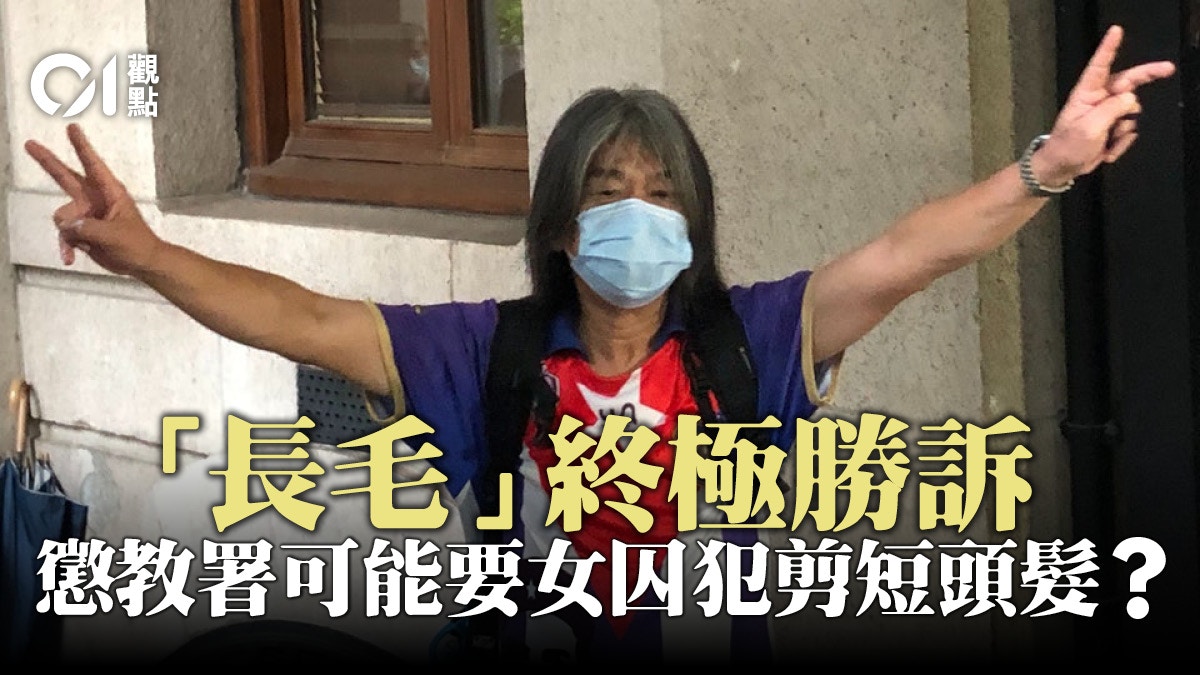01 view
Written by: Commentary Editing Room
2020-12-03 06:45
Last update date: 2020-12-03 06:45
Leung Kwok-hsiung, a former member of the Legislative Council known as "long hair," earlier filed a complaint against the Correctional Services Department for forcing male prisoners to cut their hair and attribute discrimination. Last Friday (November 27) the Court of Final Appeal ruled that Leung won the case.
The final court ruling is worthy of recognition, and the Correctional Services Department should correct administrative arrangements involving gender discrimination.
However, on Tuesday (1st), the media quoted news that the Correctional Services Department may uniformly require both male and female prisoners to wear short hair. The relevant measures have aroused widespread public concern.
Liang Guoxiong was sentenced to prison for a demonstration in 2014. During his sentence, he had to cut a long hair. Liang questioned that the Correctional Services Department required male criminals to cut their hair, but female criminals were allowed to cut hair, which was gender discrimination, so he filed for judicial review.
The case was finally appealed to the Court of Final Appeal, and the five judges unanimously ruled that Liang Guoxiong won the case and the Correctional Services Department’s actions violated the Sex Discrimination Ordinance.
Leung Kwok-hsiung, a former member of the Legislative Council known as "long hair," earlier filed a lawsuit against the Correctional Services Department for forcing male prisoners to cut their hair.
(Profile picture / Photo by Liang Pengwei)
Administrative measures cannot discriminate on sex
The judge of the final court pointed out in the judgment that the Sex Discrimination Ordinance listed four elements, of which the dispute in this case was that "the complainant was treated worse than the person for comparison." The fact that they have the right to choose the length of their hair shows that they are treated differently from female prisoners.
In fact, this is not only about "long-haired" Liang Guoxiong, other male prisoners may also have the habit of growing long hair in the past, so they are required to cut short.
The relevant arrangement was not necessarily reasonable. After Liang Guoxiong challenged the law through legal channels, the final court has also ruled that he violated the Sex Discrimination Ordinance. The authorities should review the arrangement.
Although the Correctional Services Department did not respond directly to the news that female prisoners are prohibited from leaving long posts, it only stated that it is studying the verdict and consulting the Department of Justice before deciding what to do next.
However, if the news that the Correctional Services Department intends to ban female prisoners from having long hair is true, it means that measures will be able to avoid differences in treatment between male and female prisoners and continue to cut prisoners’ hair in compliance with the Sex Discrimination Ordinance.
This is not only about the "long-haired" Liang Guoxiong. Other male prisoners may also have the habit of growing long hair in the past and are therefore required to cut it short.
(Profile picture)
Discipline and styling have no reasonable connection
What the Correctional Services Department will do in the end is yet to be determined.
However, the practice of cutting the hair of female prisoners together may meet the legal requirements of gender equality, but it may cause widespread disgust among female prisoners. What is even worse is to give some people the perception of "retaliation" after losing the lawsuit.
How to follow up court judgments in a more humane way is worthy of the Department's deep consideration.
In the Liang Guoxiong case, the Correctional Services Department believed that the purpose of putting prisoners’ hair was to ensure prison discipline and that it was necessary to restrict prisoners from being consistent in appearance. They also believed that the established shapes of men and women in society could be applied to prisoners.
However, the Court of Final Appeal has rejected the statement, and believes that ensuring the discipline of prison inmates and imposing the established model of the gender of men and women in society are not reasonably related.
The Correctional Services Department must recognize the purpose of cutting prisoners’ hair short.
Although the Department’s haircut regulations include the phrase "health and cleanliness", the Department also stated in court that it hopes prisoners’ hairstyles should follow the "traditional hairstyles," but women’s long hair does not necessarily violate hygiene or tradition.
If the hair of female prisoners did not directly cause disciplinary problems in the past, the Department should consider the decision carefully.
Correctional Services Department's abuse and beatings, prisoners' ombudsman should investigate
Persons in custody worry about retaliation and complaint mechanism should be reviewed
Correctional fraud, the government must be honest and punish the staff involved
01 view
Leung Kwok Hung Correctional Services Department 01 Views on Sex Discrimination in the Court of Final Appeal

